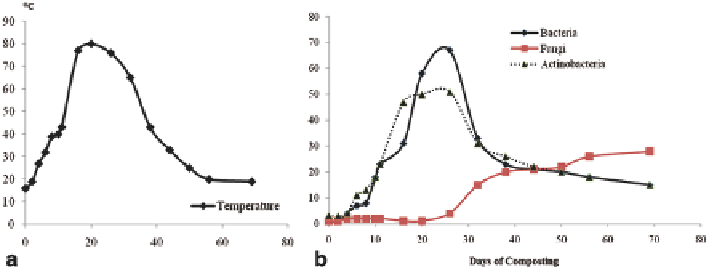Agriculture Reference
In-Depth Information
Fig. 13.1 a
Temperature variations and
b
relatives abundance evolution of the different microor-
ganisms (Bacteria, Fungi and Actinobacteria) observed during composting of MSW
and Deinococcus-Thermus (Danon et al.
2008
; Partanen et al.
2010
; Chandna et al.
2013
). The diversity of fungi during composting is lower than the one of bacteria,
fungi recovered during composting of MSW belong to the groups Mucorales, Pe-
zizomycotina, Basidiomycota, Saccharomycetaceae and Dipodascaceae, from the
phyla Ascomycota, Basidiomycota and Zygomycota (Ryckeboer et al.
2003
; Hult-
man et al.
2010
).
Compost should not contain pathogens or viable seeds both in terms of phytohy-
giene and human diseases, and it should be stable and suitable for use as biofertil-
izer or soil conditioner (Epstein
1997
; Ryckeboer et al.
2003
). Several microorgan-
isms (both bacteria and fungi) present in compost could be used as biocontrol agents
of soilborne plant pathogens, e.g.,
Flavobacterium
balustinum
,
Bacillus subtilis
,
Bacillus cereus
and
Pseudomonas fluorescens
,
Trichoderma
spp.,
Gliocladium vi-
rens
and
Paecilomyces
spp. (Raupach and Kloepper
1998
; Fuchs
2002
; Noble and
Coventry
2005
).
13.5.2
Advantages of Composting and Compost Application
The conversion of organic waste to compost results in a large quantity of mass re-
duction, which depends on the nature of the substrates and the composting process
(Amlinger et al.
2008
; Zhang and Matsuto
2010
). Addition of compost to soil modi-
fies considerably its biological, physical, and chemical properties in the short term
as well as in the long term (Ryckeboer et al.
2003
). the use of compost in agriculture
aids in replenishing and maintaining long-term soil fertility by providing optimal
conditions for soil biological activity and a slow flow of nutrients adapted to the
needs of the crop (Gobat et al.
2003
).
Composting is very well implemented in both developed countries as a way of
dealing with the biodegradable fraction of the municipal waste; the benefits of com-
posting are directed toward three directions:

